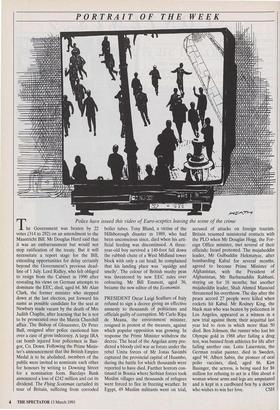PORTRAIT OF THE WEEK
Police have issued this video of Euro-sceptics leaving the scene of the crime The Government was beaten by 22 votes (314 to 292) on an amendment to the Maastricht Bill. Mr Douglas Hurd said that it was an embarrassment but would not stop ratification of the treaty. But it will necessitate a report stage for the Bill, extending opportunities for delay certainly beyond the Government's previous dead- line of 1 July. Lord Ridley, who felt obliged to resign from the Cabinet in 1990 after revealing his views on German attempts to dominate the EEC, died, aged 64. Mr Alan Clark, the former minister who stepped down at the last election, put forward his name as possible candidate for the seat at Newbury made vacant by the death of Mrs Judith Chaplin, after learning that he is not to be prosecuted over the Matrix Churchill affair. The Bishop of Gloucester, Dr Peter Ball, resigned after police cautioned him over a case of gross indecency. A large IRA car bomb injured four policemen in Ban- gor, Co. Down. Following the Prime Minis- ter's announcement that the British Empire Medal is to be abolished, members of the public were invited to nominate each other for honours by writing to Downing Street for a nomination form. Barclays Bank announced a loss of £242 million and cut its dividend. The Flying Scotsman curtailed its tour of Britain, suffering from corroded boiler tubes. Tony Bland, a victim of the Hillsborough disaster in 1989, who had been unconscious since, died when his arti- ficial feeding was discontinued. A three- year-old boy survived a 140-foot fail down the rubbish chute of a West Midland tower block with only a cut head; he complained that his landing place was ' squidgy and smelly'. The colour of British mushy peas was threatened by new EEC rules over colouring. Mr Bill Emmott, aged 36, became the new editor of the Economist.
PRESIDENT Oscar Luigi Scalfaro of Italy refused to sign a decree giving an effective amnesty to thousands of politicians and officials guilty of corruption. Mr Carlo Ripa de Meana, the environment minister, resigned in protest at the measure, against which popular opposition was growing. In response the Prime Minister withdrew the decree. The head of the Angolan army pre- dicted a bloody civil war as forces under the rebel Unita forces of Mr Jonas Savimbi captured the provincial capital of Huambo, during the battle for which thousands were reported to have died. Further horrors con- tinued in Bosnia where Serbian forces took Muslim villages and thousands of refugees were forced to flee in freezing weather. In Egypt, 49 Muslim militants went on trial, accused of attacks on foreign tourists. Britain resumed ministerial contacts with the PLO when Mr Douglas Hogg, the For- eign Office minister, met several of their officials; Israel protested. The mujaheddin leader, Mr Gulbuddin Hekmatyar, after bombarding Kabul for several months, agreed to become Prime Minister of Afghanistan, with the President of Afghanistan, Mr Burhanuddin Rabbani, staying on for 18 months; but another mujaheddin leader, Shah Ahmed Massoud threatened his overthrow. The day after the peace accord 27 people were killed when rockets hit Kabul. Mr Rodney King, the black man who was beaten by policemen in Los Angeles, appeared as a witness in a new trial against them; their acquittal last year led to riots in which more than 50 died. Ben Johnson, the runner who lost his Olympic gold in 1988 after failing a drug test, was banned from athletics for life after failing another one. Lotte Laserstein, the German realist painter, died in Sweden, aged 94. Albert Sabin, the pioneer of oral polio vaccines, died, aged 86. Kim Basinger, the actress, is being sued for $6 million for refusing to act in a film about a woman whose arms and legs are amputated and is kept in a cardboard box by a doctor
who wishes to win her love. CSH


























































 Previous page
Previous page